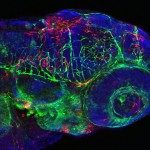Lien vers Pubmed [PMID] – 8627157
J. Exp. Med. 1996 Feb;183(2):439-49
P815 is a murine mastocytoma of DBA/2 origin which, although immunogenic, rapidly develops as a tumor in immunocompetent syngeneic hosts. In this report, we have studied, by a molecular approach, the in vivo alpha/beta T cell response to P815. Both situations of tumor growth after engraftment of naive animals or tumor rejection by preimmunized animals have been analyzed. The spectrum of T cell receptor beta chain rearrangements in the tumor-infiltrating lymphocytes was found to be highly variable among individual tumor-bearing mice. However, two rearrangements, one using V(beta)1 and J(beta)1.2 segments and one using the V(beta)1 and J(beta)2.5 segments, with conserved junctional regions, reproducibly emerge in most individuals. These two rearrangements thus correspond to “public” (recurrent) T cell clones, as opposed to “private” ones, which emerge in a seemingly stochastic fashion in immunized animals. Importantly, these public cells are observed in situations of either growth or rejection of the tumor. Quantification provides a clear increase in public T cells in secondary responses, but no obvious correlation provides between their level and primary tumor rejection. The V(beta)1- J(beta)1.2 rearrangement is borne by CTL directed against an antigen derived from P1A, a nonmutated mouse self protein which is expressed in P815 but not in normal mouse tissues except testis. A recurrent, public T cell response can thus be observed to an antigen derived from a self protein expressed by a tumor.

